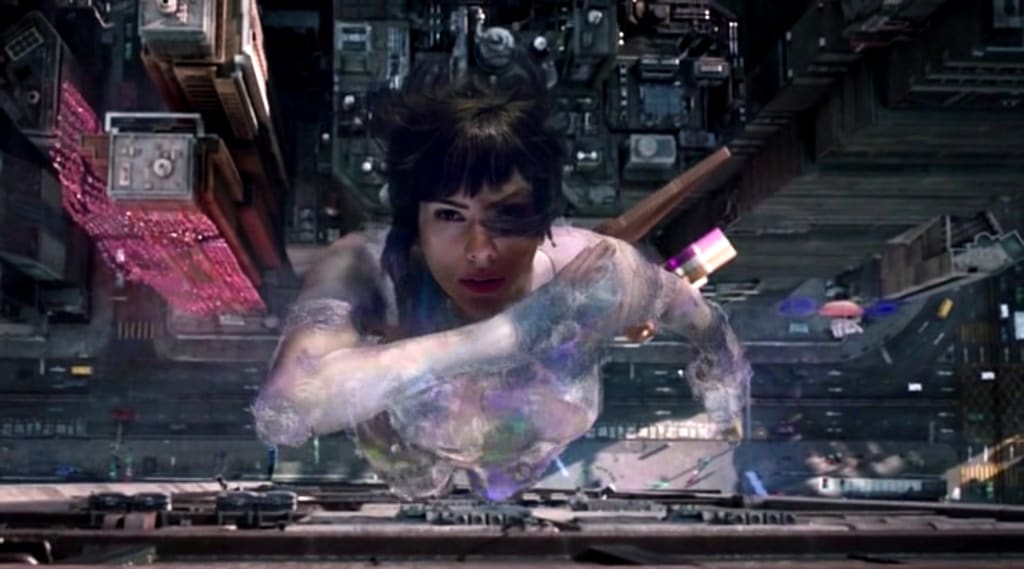
Western entertainment media is feeling more and more pressure to be more diverse in ethnicity than it has been for decades. For the most part I’m behind this notion as it’s important that acting talent is recognized regardless of ethnicity and because seeing ones culture represented in media as more than just stereotypes is significant for marginalized groups. However I’m curious if there’s a scenario when having a white actor play a non-white character is ever okay. I think it’s safe to say that it’s not okay for a white person to play a character in a film who isn’t white. I’m more torn on if it’s ever okay to change the ethnicity of a character to white when a film is based on pre-existing characters. For this I would like to consider the live action version of Ghost in the Shell. There was criticism when white actress Scarlet Johansson was cast as the protagonist despite her character being Japanese in the anime. This adaptation was poorly received commercially and critically, but I think it’s worth discussing for this topic. As I mentioned some people were critical of the film’s race swapping, but I think this scenario is more complex than most for a few reasons.
Ethics vs Capitalism
At times movies can be hard to classify, they are artistic expression but they are also a product to be sold to consumers. Therefore, directors and studios want to make something great, but they also want to maximize profit. So they might make decisions they wouldn’t normally make so the film is more accessible. In the the case of Ghost in the Shell this means you hire arguably the most well known actress in Hollywood instead of an Asian actress western audiences are far less familiar with. Director Ridley Scott has described the pressure to hire well known actors in his film Exodus Gods and Kings in a culturally insensitive way I won’t repeat here. So it appears that such pressure is real or at least perceived as real. I’m unsure if I can fault Ghost in the Shell for caving to this pressure. When millions of dollars are invested in a film, it’s understandable that directors and studios try to make it as marketable as possible. Unfortunately this often continues the trend of movies being too white. Personally, I like to think some good came out of this film. It’s a shame more Asian actors were not given big paychecks and great exposure from from this film, but if the film wasn’t made at all I wouldn’t have ever watched the original Ghost In The Shell. I’m sure I’m not the only one who thought the trailer looked cool, heard the adaptation was bad and watched the anime instead.
Who was upset?
Another thing to consider in the Ghost in the Shell controversy is who was upset with casting. Apparently most criticism came from the West rather than Japan itself. Japanese audiences were generally okay with the casting, but criticism mainly came from Japanese-Americans. There’s no denying that Asian-Americans are poorly represented in western media, but in this case the character was originally Japanese rather than Japanese-American so its unclear to me if the critics are right to be upset when the people of Japan are not.
The Creative Vision
Since this is an adaptation I think the creator of the anime’s opinion should hold some weight. With that in mind Masamune Shirow was thrilled with the casting of Scarlet Johansson. Therefore he feels the ethnicity change is not a distortion of the character he created. However creator approval can’t be taken too seriously. The film V For Vendetta comes to mind when I think of a good adaptation that was criticized by the originals creator. Optimistically, I like to think that V for Vendetta exposes wider audiences to concepts they wouldn’t normally explore despite its flaws, just as Ghost in the Shell likely exposed wider audiences to anime.
Themes of the Film
Probably the biggest reason for choosing Ghost in the Shell as the focal point for this topic is the themes of identity expressed in the anime. A theme that is popular in a lot of cyber punk media. This is the concept of consciousness being more important than the vessel that’s holding it. If this concept is expanded upon, one could argue that the ethnicity of Ghost in the Shell’s lead character is irrelevant because the consciousness is what really matters.
Conclusion
Considering all my thoughts on the concept of whitewashing I still don’t know if my main example of Ghost in the Shell is acceptable or if other movies with similar criticisms are ever ethical. In most cases whitewashing is selling out and a couple conditions unique to Ghost in the Shell don’t change that. However, I don’t know if selling out is inherently unethical given the fact that most studios have a goal of maximizing profit. What I do know is that studios who are willing to move past this to hire diverse casts should be praised and supporting films like that may encourage larger companies to do the same.
About the Creator
CK
Glad to have a place to write my thoughts down





Comments
There are no comments for this story
Be the first to respond and start the conversation.